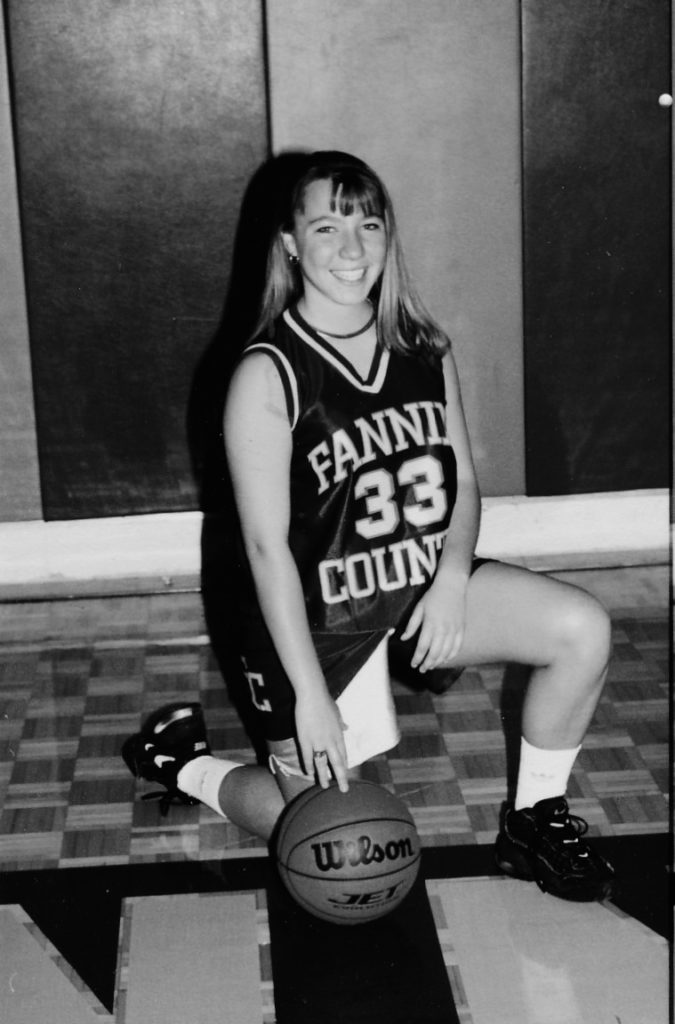 For Roxie Reed Trovato, collecting hardware from the Fannin County Sports Hall of Fame has become almost a habit. Roxie already has two medallions that she earned by being a member of teams inducted into the Hall. First, she collected a medal along with her teammates on the 1998-1999 Fannin County High School girls basketball team. Then, last year she collected another medallion as a member of the 1996-1997 Lady Rebels. To complete the hat trick, Roxie has been elected as an individual member of the induction class of 2019. She will collect a plaque celebrating her membership at the FCSHOF induction on April 6, 2019.
For Roxie Reed Trovato, collecting hardware from the Fannin County Sports Hall of Fame has become almost a habit. Roxie already has two medallions that she earned by being a member of teams inducted into the Hall. First, she collected a medal along with her teammates on the 1998-1999 Fannin County High School girls basketball team. Then, last year she collected another medallion as a member of the 1996-1997 Lady Rebels. To complete the hat trick, Roxie has been elected as an individual member of the induction class of 2019. She will collect a plaque celebrating her membership at the FCSHOF induction on April 6, 2019.
The 1990s were halcyon days for the Fannin County High School Lady Rebels basketball teams. The 1992-1993 young ladies captures the Georgia State Class AA State Championship. As a follow-up, the four year period of competition from 1995 through 1999 saw the Lady Rebels post an impressive overall record of 103 victories and only nine defeats. During that period, the Fannin girls finished as state runners-up in 1997 and captured the Class AA State Championship in 1998-99. These teams performed like a talented symphony with all the necessary instruments and directing the teams from the point guard position was the gifted maestro, Roxie Reed Trovato.
On the basketball court, Roxie was the consummate defender and leader of the offense. She controlled the tempo and was a master of the no-look and behind the back passes. Her stylish play was not for show, however, as her passing skills resulted in many easy baskets for her teammates. She was the recipient of the team Playmaker Award as a sophomore and as a junior and, at the end of her senior season, she was honored as the All-Time career assist leader at Fannin County High School. During the State Championship season of 1998-99 she averaged more than 10 assists per game. She was selected as the Northwest Georgia Tip-Off Club Player of the month in February, 1999.
Roxie performed at her best under pressure and, in the 1999 State semi-final game against Dodge County she scored 13 points, dished out nine assists and, according to the News Observer ‘ran the offense flawlessly’. Her coach Johnny Farmer gushed “that’s the best I’ve seen her play in four years. It seemed like she ran faster than she ever had, hit her free throws and was determined not to give the ball up”.
In the lexicon of sport Roxie Reed Trovato epitomized the term ‘gamer’. She relished competition and had the ability to convert her passion into success in the arena or on the field. She started at shortstop for the Lady Rebels all four years that she competed. She was a leader on the field, timely hitter and outstanding fielder helping Fannin County High advance to the State Tournament three times during her career.
If her basketball and softball exploits were not enough, Roxie made the Fannin High tennis team as a freshman and was soon elevated to the Number One singles slot. She maintained that position throughout the three years that she competed and posted a 7-1 record in singles competition as a senior in 1999.
After graduating from high school in 1999, Roxie was awarded a basketball scholarship to attend Truett-McConnell College in Cleveland, Georgia. She was the starting point guard there for two seasons and was named as the team Best Offensive Player following her second year. She also participated in all intra-mural sports available to her. Her athleticism was noted by the soccer team coach who recruited her to play with his team during her sophomore year. She was good enough to earn a partial scholarship for this participation.
Roxie continued her basketball career at Limestone College in Gaffney, South Carolina. She played there for two seasons and, before completing her requirements for graduation, was invited to a WNBA combine in Orlando, Florida. She graded high enough there to be offered an opportunity to play with a WNBA satellite team overseas. She considered this possibility but decided to remain stateside and complete her college degree program.
She returned to Limestone and discovered that she had some athletic eligibility remaining. She was awarded a golf scholarship and graduated from Limestone with a degree in physical education/health science in 2003.
Roxie briefly considered entering the coaching profession but opted to begin raising a family. She married John Trovato and soon was the mother of two children, a son Chandler (who is now 10) and a daughter Riley (now 8). She and her family make their home in Cleveland, Tennessee where Roxie stays busy raising and supporting the education and activities of her two children.
In case you have not been keeping score at home, Roxie Reed Trovato competed in five (5) different sports during her high school and college days – basketball, softball, tennis, soccer and golf. She also played football for a youth team in early grade school, so if one includes that sport, Roxie participated in six sports between the ages of 8 and 21. She is truly a remarkable athlete and a 5-star recruit for the Fannin County Sports Hall of Fame.





























 Tommy Jones has enjoyed an exceptional 30 plus year career as a participant in and a coach of the sports of track and field and cross country. His many accomplishments have earned him a spot in the Fannin County Sports Hall of Fame class of 2019.
Tommy Jones has enjoyed an exceptional 30 plus year career as a participant in and a coach of the sports of track and field and cross country. His many accomplishments have earned him a spot in the Fannin County Sports Hall of Fame class of 2019.

























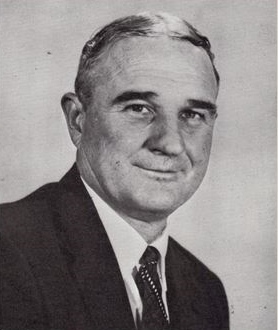 In recognition of his contributions as an early and lifetime supporter of the athletic programs in Fannin County schools, Travis Guthrie has been elected as a member of the 2019 class of the Fannin County Sports Hall of Fame.
In recognition of his contributions as an early and lifetime supporter of the athletic programs in Fannin County schools, Travis Guthrie has been elected as a member of the 2019 class of the Fannin County Sports Hall of Fame.









































 In 2015 the Fannin County Sports Hall of Fame began a program of awarding scholarships to senior Fannin County High School scholar-athletes for the continuation of their studies at the college level. Each year an equal number of scholarships are awarded to female and male students. The number and amount of the scholarships may vary each year, depending upon the availability of funds. Since the FCSHOF is a non-profit organization and depends on the generosity of the public toward our fund-raising events, the amount available for scholarships is directly proportionate to the giving levels of our supporters. Since 2015, a total of $12,000 has been distributed to qualified students as follows: 2015 – Molly Chandler and Dusty Dyer; 2016 – Colton Carpenter and Ashley Rhodes; 2017 – Kelli Cox, Parker Brown, Haylee Franklin and Lucus Walden and 2018 – Payton Holt, Cody Jacobs, Shayna Bowyer and Lillyanna Ballew. A plaque honoring the scholarship winners is on display in the upper level of the Fannin County Recreation Center. Anyone wishing to participate in the scholarship program may send contributions to: FCSHOF, P.O. Box 775, McCaysville GA 30555.
In 2015 the Fannin County Sports Hall of Fame began a program of awarding scholarships to senior Fannin County High School scholar-athletes for the continuation of their studies at the college level. Each year an equal number of scholarships are awarded to female and male students. The number and amount of the scholarships may vary each year, depending upon the availability of funds. Since the FCSHOF is a non-profit organization and depends on the generosity of the public toward our fund-raising events, the amount available for scholarships is directly proportionate to the giving levels of our supporters. Since 2015, a total of $12,000 has been distributed to qualified students as follows: 2015 – Molly Chandler and Dusty Dyer; 2016 – Colton Carpenter and Ashley Rhodes; 2017 – Kelli Cox, Parker Brown, Haylee Franklin and Lucus Walden and 2018 – Payton Holt, Cody Jacobs, Shayna Bowyer and Lillyanna Ballew. A plaque honoring the scholarship winners is on display in the upper level of the Fannin County Recreation Center. Anyone wishing to participate in the scholarship program may send contributions to: FCSHOF, P.O. Box 775, McCaysville GA 30555.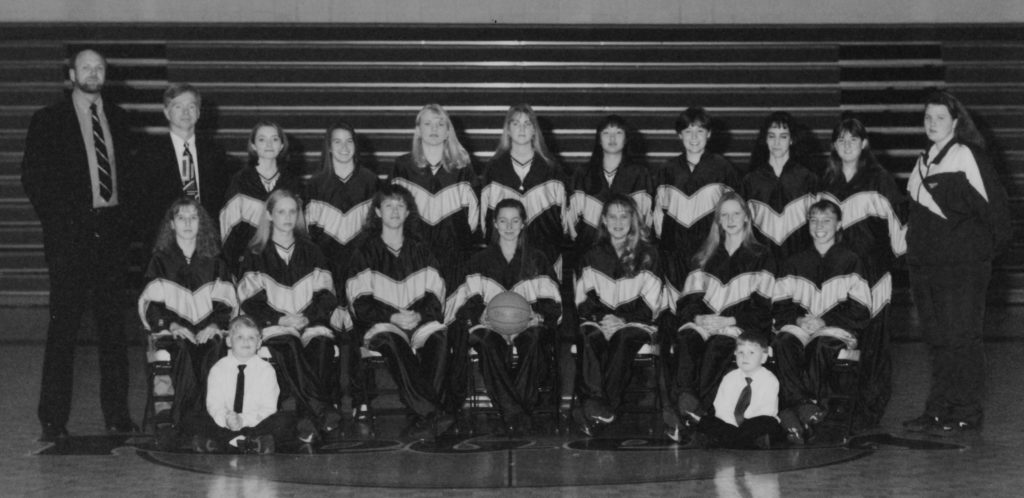 Johnny Farmer coached the Fannin County High School girls team from 1981-2007. During his time at the school, the Lady Rebels won a total of 509 games, won two state championships and finished as state runners-up on two occasions. The 1996-97 Fannin County High School girls team advanced to the Class AA championship game before losing to Thomasville. In recognition of their dramatic journey to the final game, the 1996-97 Fannin County Lady Rebels team has been chosen as the team selection in the Fannin County Sports Hall of Fame induction class of 2018.
Johnny Farmer coached the Fannin County High School girls team from 1981-2007. During his time at the school, the Lady Rebels won a total of 509 games, won two state championships and finished as state runners-up on two occasions. The 1996-97 Fannin County High School girls team advanced to the Class AA championship game before losing to Thomasville. In recognition of their dramatic journey to the final game, the 1996-97 Fannin County Lady Rebels team has been chosen as the team selection in the Fannin County Sports Hall of Fame induction class of 2018.




















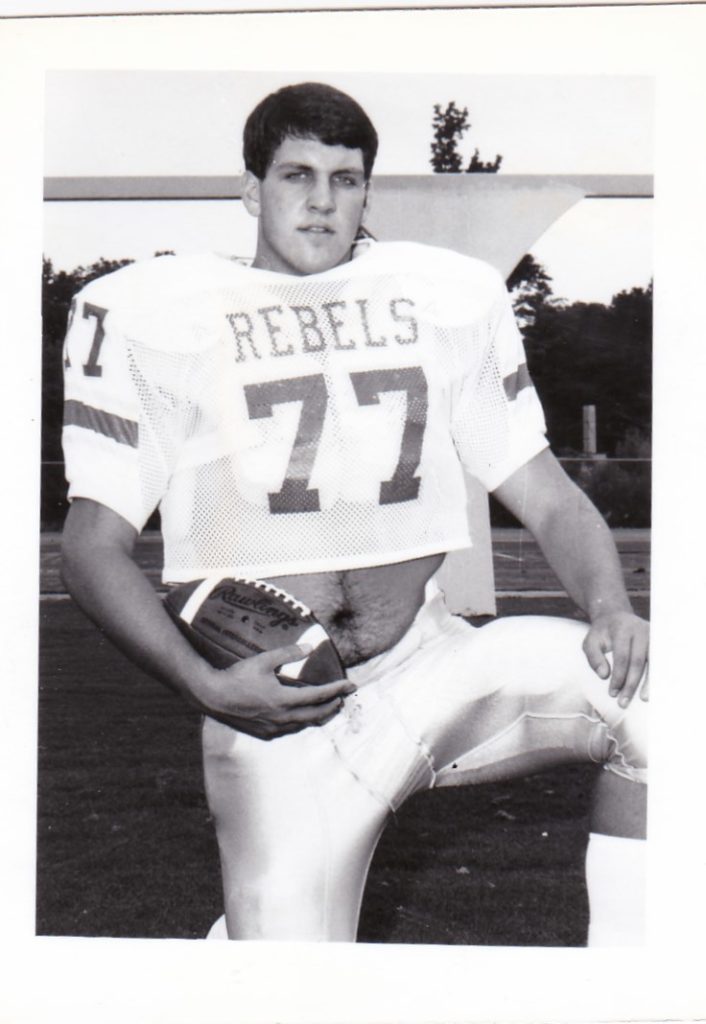 Between 1985 and 1993 Tim Jabaley played the game of football as an offensive lineman first at Fannin County High School and then at the University of Tennessee at Chattanooga. His proficiency at that craft has been recognized by the Fannin County Sports Hall of Fame voters who have elected him to the induction class of 2018. Tim also played in the defensive line at Fannin County but is best remembered for his performances on the offensive side of the line of scrimmage.
Between 1985 and 1993 Tim Jabaley played the game of football as an offensive lineman first at Fannin County High School and then at the University of Tennessee at Chattanooga. His proficiency at that craft has been recognized by the Fannin County Sports Hall of Fame voters who have elected him to the induction class of 2018. Tim also played in the defensive line at Fannin County but is best remembered for his performances on the offensive side of the line of scrimmage.




























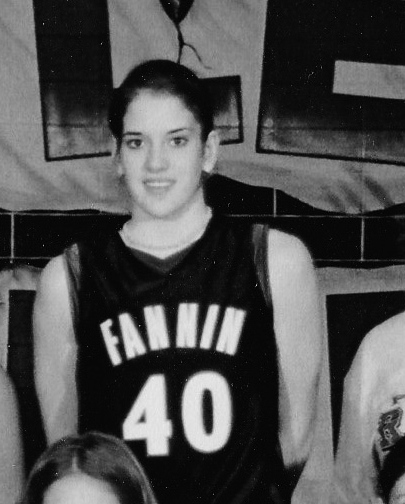 2018 Fannin County Sports Hall of Fame inductee Stephanie Scearce began her competitive basketball career as a second grader and did not hang up her sneakers until a knee injury permanently sidelined her just before her senior season at Kennesaw State University. It was her third serious knee injury in a career full of a lot of euphoric highs and a few devastating lows.
2018 Fannin County Sports Hall of Fame inductee Stephanie Scearce began her competitive basketball career as a second grader and did not hang up her sneakers until a knee injury permanently sidelined her just before her senior season at Kennesaw State University. It was her third serious knee injury in a career full of a lot of euphoric highs and a few devastating lows.


















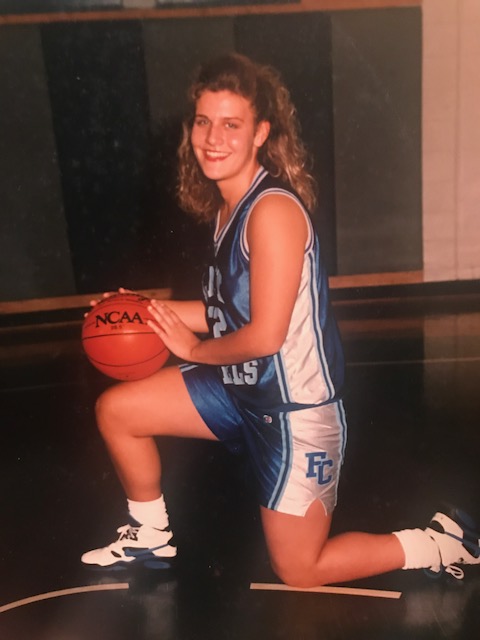 2018 Fannin County Sports Hall of Fame inductee Leslie Jabaley Mann came about her athletic prowess honestly. Athleticism is practically a tradition in the Jabaley family. Her father Ron excelled at football, baseball and wrestling during his playing days and was a 2015 inductee into the Hall of Fame. Her brother Tim will join her as an inductee in the class of 2018. Brother Chris was also an outstanding football player at Fannin County High School and is a top notch golfer.
2018 Fannin County Sports Hall of Fame inductee Leslie Jabaley Mann came about her athletic prowess honestly. Athleticism is practically a tradition in the Jabaley family. Her father Ron excelled at football, baseball and wrestling during his playing days and was a 2015 inductee into the Hall of Fame. Her brother Tim will join her as an inductee in the class of 2018. Brother Chris was also an outstanding football player at Fannin County High School and is a top notch golfer.

















 2018 Fannin County Sports Inductee Mandy Anderson scored more than 1,000 points during her basketball career at Fannin County High School between 1999 and her graduation in the spring of 2003. She then continued her basketball career at Reinhardt University in Waleska, Georgia where she scored 1,138 points in a four year career with the Lady Eagles making her the only basketball player in the history of Fannin County to score more than 1,000 points at both the high school and college level.
2018 Fannin County Sports Inductee Mandy Anderson scored more than 1,000 points during her basketball career at Fannin County High School between 1999 and her graduation in the spring of 2003. She then continued her basketball career at Reinhardt University in Waleska, Georgia where she scored 1,138 points in a four year career with the Lady Eagles making her the only basketball player in the history of Fannin County to score more than 1,000 points at both the high school and college level.





























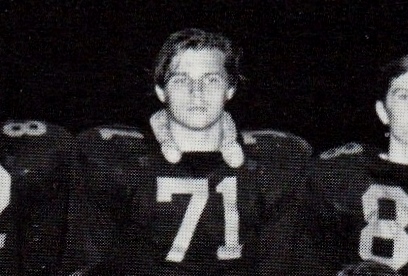 In recognition of his outstanding football career at East Fannin High School from 1968-1972, Keith Dockery has been elected to the Fannin County Sports Hall of Fame.
In recognition of his outstanding football career at East Fannin High School from 1968-1972, Keith Dockery has been elected to the Fannin County Sports Hall of Fame.



























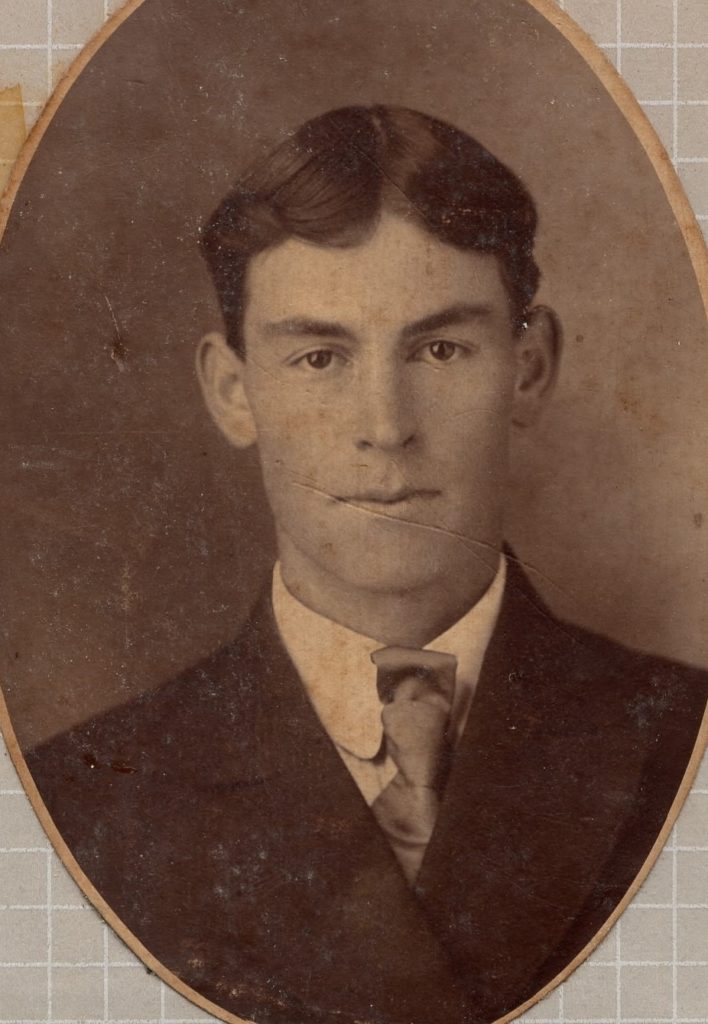 r women like John Mercer Carter only come along once or twice in a generation. Mr. Carter was a man of extraordinary character, vision and energy who devoted much of his 102 years on earth to education, athletics and public service in and around Fannin County. In recognition of his many accomplishments and contributions to athletics, both as a participant and as a coach and administrator, John Carter has been elected to the Fannin County Sports Hall of Fame Class of 2018.John was born in the community of Cobbs, North Carolina, close to the Georgia border in September, 1886. His father J.M. Carter was an educator and evangelist of some note who moved the family to Mineral Bluff and then to a farm near Morganton, Georgia before John reached the age of 10. J.M. Carter was one of the principals in the establishment of the North Georgia Baptist College in Morganton, a school that provided a quality education to students between grade one through two years of college. It was here that John Carter received his rudimentary education before moving on to the University of Georgia to complete the requirements to teach in schools at that time. He began his teaching career at a one room school in Hemp, Georgia in 1908.John Carter discovered the game of baseball around the turn of the century. In his book ‘Trails of the Past’, Carter tells of visits to his grandparents in Bellvue, North Carolina after his family had moved to Morganton. Another young man, Ty Cobb, who was two months younger than John, also visited his grandparents in the same community around that same time. The two boys played together as youngsters and, most likely faced each other in baseball games during the early years of the century. John had begun his career with the team from North Georgia Baptist College and Ty was often drafted to play with the semi-pro team in nearby Murphy, North Carolina while visiting in Bellevue. Cobb began his professional career when he signed with the Augusta, Georgia team in April, 1904, just as John Carter was completing his high school education.
r women like John Mercer Carter only come along once or twice in a generation. Mr. Carter was a man of extraordinary character, vision and energy who devoted much of his 102 years on earth to education, athletics and public service in and around Fannin County. In recognition of his many accomplishments and contributions to athletics, both as a participant and as a coach and administrator, John Carter has been elected to the Fannin County Sports Hall of Fame Class of 2018.John was born in the community of Cobbs, North Carolina, close to the Georgia border in September, 1886. His father J.M. Carter was an educator and evangelist of some note who moved the family to Mineral Bluff and then to a farm near Morganton, Georgia before John reached the age of 10. J.M. Carter was one of the principals in the establishment of the North Georgia Baptist College in Morganton, a school that provided a quality education to students between grade one through two years of college. It was here that John Carter received his rudimentary education before moving on to the University of Georgia to complete the requirements to teach in schools at that time. He began his teaching career at a one room school in Hemp, Georgia in 1908.John Carter discovered the game of baseball around the turn of the century. In his book ‘Trails of the Past’, Carter tells of visits to his grandparents in Bellvue, North Carolina after his family had moved to Morganton. Another young man, Ty Cobb, who was two months younger than John, also visited his grandparents in the same community around that same time. The two boys played together as youngsters and, most likely faced each other in baseball games during the early years of the century. John had begun his career with the team from North Georgia Baptist College and Ty was often drafted to play with the semi-pro team in nearby Murphy, North Carolina while visiting in Bellevue. Cobb began his professional career when he signed with the Augusta, Georgia team in April, 1904, just as John Carter was completing his high school education.






















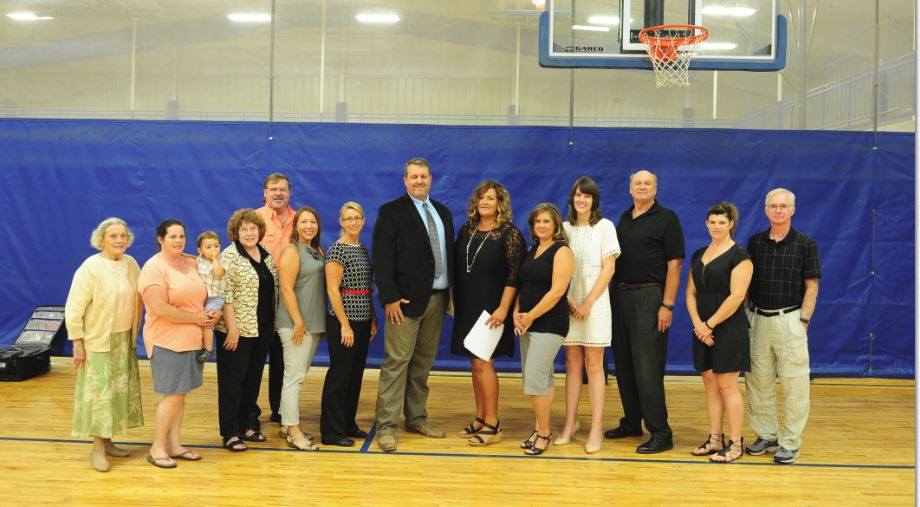


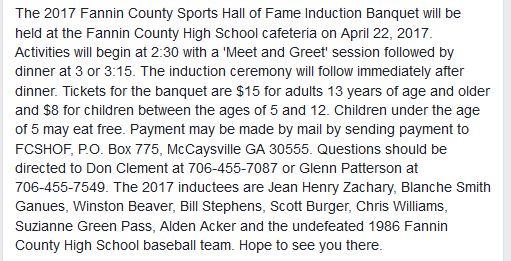
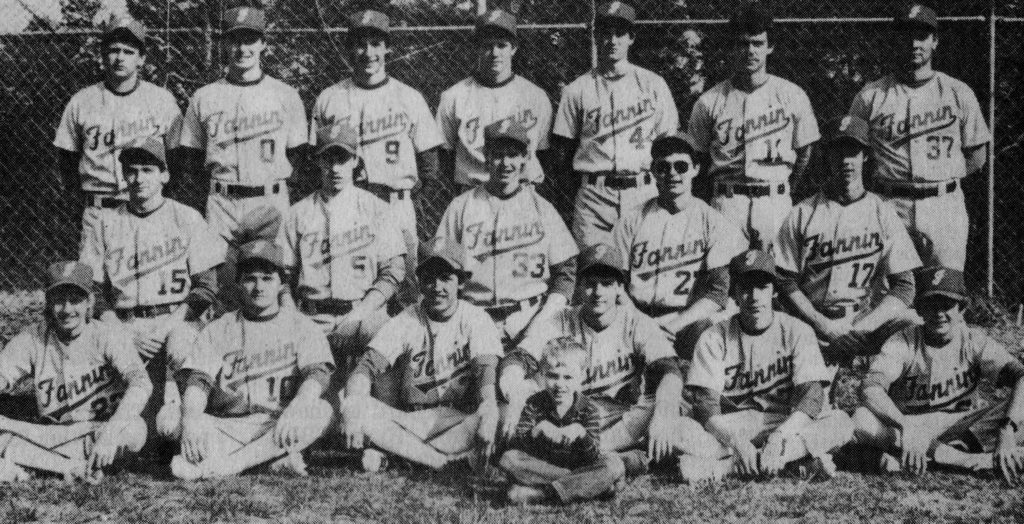 With the possible exception of athletes who play football for the University of Alabama or women’s basketball at the University of Connecticut, being a part of an undefeated team at any level of competition is something very special. Few teams in the history of Fannin County have managed to run the gauntlet of an entire season of competition unscathed. The 1986 (1985-86 school year) Fannin County High School baseball team, however, managed to do just that. The lusty 18-0 regular season record posted by the 1986 has earned them a place in the Fannin County Sports Hall of Fame Class of 2017.
With the possible exception of athletes who play football for the University of Alabama or women’s basketball at the University of Connecticut, being a part of an undefeated team at any level of competition is something very special. Few teams in the history of Fannin County have managed to run the gauntlet of an entire season of competition unscathed. The 1986 (1985-86 school year) Fannin County High School baseball team, however, managed to do just that. The lusty 18-0 regular season record posted by the 1986 has earned them a place in the Fannin County Sports Hall of Fame Class of 2017.



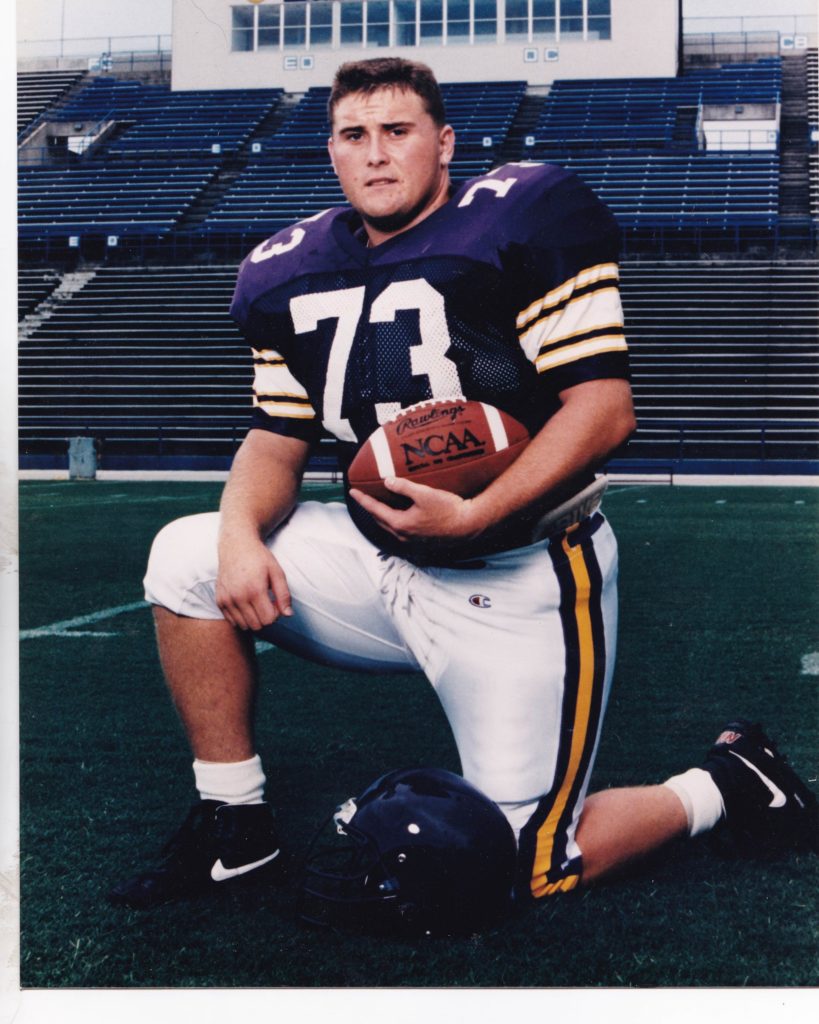 Mineral Bluff native Chris Williams donned a football uniform for the first time as a member the East Fannin Junior High School Wildcats in the fall of 1983. It was the first step in a 19-year journey during which the game of football would be an important part of his life, first as a player and then as a coach. His resume of outstanding gridiron accomplishments has earned him a place in the Fannin County Sports Hall of Fame, class of 2017.
Mineral Bluff native Chris Williams donned a football uniform for the first time as a member the East Fannin Junior High School Wildcats in the fall of 1983. It was the first step in a 19-year journey during which the game of football would be an important part of his life, first as a player and then as a coach. His resume of outstanding gridiron accomplishments has earned him a place in the Fannin County Sports Hall of Fame, class of 2017.





